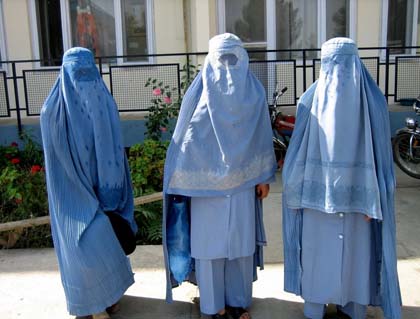In spite of remarkable achievements in the last couple of years in the lives of women, the vision of Taliban's return still circulates among women. As the U.S and NATO are on the loop to depart their forces from Afghanistan by December 2014, most women and international rights advocates are growing increasingly concerned on women's rights.
They fear that decade-long focus on developing the rights of Afghan women will all go with their departure and that all the efforts on women's rights are considered extremely fragile as the continued attacks on girl's schools, discrimination and restriction on women's movement still persist to come into view, despite international's presence with focus on women's rights. As per the current ground challenges that the women are facing, the NATO leaders are ignoring the Afghan women and their tenuous grasp on rights and freedoms while planning their military exit strategy.
This fact cannot be ignored that the vital gains that Afghan women have had over the past decades, are all due to huge sacrifices and devotions of the U.S and its broader NATO alliance. In fact, they were the two fundamental forces who have brought such considerable changes in the lives of women and children who were going through tremendous violence and discrimination with ultimate deprivation from getting education and social decision making process.
And who can forget the rule of the Taliban Regime, when 70% of our people were malnourished and 25% of children used to die before the age of five. Thus, a decade ago, after years of war with the Soviet Union, followed by the rise of the Taliban, the fundamental infrastructure, such as roads and schools used to lie in ruins. In rural areas, potable water, electricity and access to health care facilities are still a luxury rather than the norm.
As the NATO summit concluded in Chicago, it didn't include considerable number of women in the gathering to put some light on the ground challenges that the Afghan women are still facing or congratulate the international community's active commitment in the fight for helping to improve the quality of Afghan women's lives to lead a life free of violence and discrimination in the last couple of years and the 10th anniversary of the return of the Afghan girls to the very dreaming classrooms that they were completely deprived of at the time of Taliban. The US and NATO deserve international gratitude for their role in helping to improve the lives of Afghan women. But now, as the US and NATO mission in Afghanistan changes, the world must reaffirm their commitment in protecting the rights of Afghan women after 2014.
According to Frank Januzzi, the Director of Amnesty International's Washington office, the Afghan delegation to the NATO summit led by President Karzai, included only one woman, a member of the Afghan parliament in the summit who couldn't highlight the key challenges that Afghan women are facing or hear their next plan for women after the NATO and U.S troops depart from the region. This has created further worries among the Afghan women, as seen that the government doesn't have any particular concern over the rights of women in Afghanistan.
According to Cathy McMorris Rodgers (R-WA) and Donna Edwards (D-MD), the co-chairs of the Afghan women's task force while talking in a presence conference added that the transition of security responsibility to Afghan forces and the corresponding withdrawal of the international troops could have a negative impact on women's security and participation in public life and that this initiatives could likely worsen situation for the Afghan women after 2014, when NATO troops and U. S forces are shifted from combat to technical support.
In this climate, the Afghan women understandably fear losing everything they achieved with the support of international community in the last more than ten years of bloodshed. Though many victories have been won for the Afghan people and better ground was prepared for their positive growth, they still fear that it is all at risk and the return of the Taliban is an impending threat to our both political and social growth and sustainability. The growing consequences of such a return would be devastating and would lead the women into a dark shadow of violence and discrimination once more.
After the fall of Taliban, in 2001, the world was watching the horrors suffered by Afghan women to see what world can do to protect the rights of Afghan women. Leaders from government, business and civil society around the globe, as well as private citizens, stepped forward to support these women, sending a powerful signal that progress is possible only if it includes all of a country's citizens. But if this progress is to last, these business and educational investments must be protected and expanded at any point of time.
Yet, every bit as important, the Afghan government should not negotiate away the rights of Afghan women just with empty promises. At the Chicago gathering, world's leaders have had the opportunity to highlight the key challenges that the women of Afghanistan are facing today and create new and innovative plan in response to enable the women be self-reliant after the complete withdrawal of the NATO troops from the region. There must be aid, investment on women's rights.
Having already witnessed the horrible cost of denying the most fundamental human rights and freedoms, the world should not give up on Afghan women because the Afghan women can't afford to put at risk their achievements and freedom. The world shouldn't abandon the Afghan women at this crucial point of time. The NATO member countries should reaffirm their commitments to support important rights of Afghan women, including freedom of movement, full participation in public life, freedom from violence, access to government services, and security so that they should be able to live a life free from violence and discrimination as they are entitled to.

